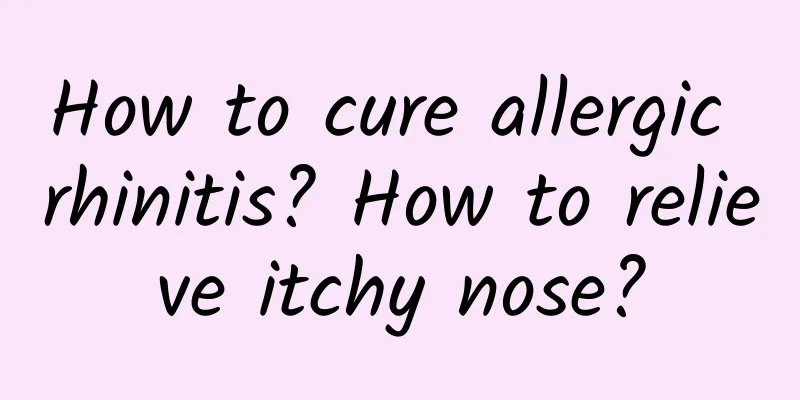How to cure allergic rhinitis? How to relieve itchy nose?

|
Allergic rhinitis is an inflammation that many people suffer from. It is easy to relapse and become more and more serious. Allergic rhinitis can be controlled by medication, but it is not easy to cure it. So how to relieve the itching of the nose caused by allergic rhinitis? How to cure allergic rhinitisAllergic rhinitis cannot be cured, it can only be suppressed. The treatment of allergic rhinitis is divided into avoiding contact with allergens, drug treatment, and desensitization therapy. Avoid contact with allergensThis is the most important measure to prevent and treat the disease. Special masks, nasal filters, pollen blockers, etc. can be used to reduce the inhalation of allergenic pollen and dust mites and relieve nasal symptoms. Drug treatmentThe first choice of drugs is nasal glucocorticoids (mometasone furoate nasal spray, budesonide nasal spray, fluticasone propionate nasal spray, etc.), in addition, oral second-generation antihistamines (loratadine, cetirizine, etc.), nasal antihistamines (azelastine hydrochloride nasal spray, etc.), oral anti-leukotriene drugs (montelukast, etc.) can also be used. They can be used alone or in combination as appropriate. In addition, nasal irrigation can be used as an auxiliary treatment for allergic rhinitis. Because the specific drugs and dosages for adults, pregnant women and children of different ages are different, they should be purchased and used under the guidance of a doctor. Desensitization therapyIt stimulates the body with gradually increasing doses of allergens so that the body is no longer sensitive to allergens. The effect of this therapy is accurate, but it can only desensitize dust. It is suitable for patients with single dust mite allergies or patients with fewer other allergens (1-2 types). How to relieve itchy nose caused by allergic rhinitis(1) Avoid allergens as much as possibleFrom late August to October every year, the "summer and autumn pollinosis" outbreak period in northern my country. Many people will experience symptoms such as itchy eyes, itchy nose, sneezing, runny nose, and dry cough. It is almost impossible for pollen allergy patients to isolate themselves from the air, but they still need to pay attention to protection. Wear a mask when going out, wash the face, nasal cavity, eyes and other parts with pollen in time when you go home, and change outer clothes to reduce pollen contact. In addition, there are abundant varieties of seafood in autumn, which are plump and fresh, but people who are prone to allergies should eat less to avoid aggravating their allergies. (2) Clean the nasal cavity with sea salt waterFlushing the nasal cavity with sea salt water can help to clean out allergens in the nasal cavity and also relieve dry nasal mucosa. (3) Oral anti-allergic drugsAt present, commonly used anti-allergic drugs include second-generation antihistamines such as loratadine, ebastine, cetirizine, and fexofenadine. When symptoms are severe, two drugs can be used in combination. In addition, the leukotriene receptor antagonist montelukast can also alleviate the symptoms of allergic rhinitis. (4) Glucocorticoid nasal sprayCommonly used nasal sprays include fluticasone propionate nasal spray, budesonide nasal spray, mometasone furoate nasal spray, etc. Glucocorticoid nasal spray has clear nonspecific anti-inflammatory, anti-edema, and anti-allergic effects, and can alleviate the symptoms of allergic rhinitis. (5) Improve the body’s immunityStrengthening exercise and improving the body's immunity can also reduce the incidence of allergic rhinitis. Can I use a nasal rinser for allergic rhinitis?It can be used. A nasal rinser is a tool for flushing the nasal cavity with saline solution. The nasal rinser generates a certain pressure to send saline solution into the nostrils, which flows through the nasal vestibule, nasal passages, around the nasopharynx, and is discharged from the other nostril or from the mouth. Nasal irrigation is generally applicable to all nasal diseases, including allergic rhinitis. Allergic rhinitis is caused by the release of IgE-mediated mediators (mainly histamine) after an atopic individual comes into contact with an allergen, and involves a variety of immune-active cells and cytokines. Nasal irrigation can clean allergens, and frequent nasal irrigation can increase the tolerance of the nasal cavity to allergens. Nasal irrigation can significantly reduce histamine concentration, reduce the release of mast cells and basophils, and reduce the release of cytokines for a certain period of time, which can also relieve allergic symptoms. |
>>: Why can't Satsuma mandarin be sold? How is the market for Satsuma mandarin this year?
Recommend
What tests should be done for prolactin cell adenoma
Prolactin cell adenoma is common in middle-aged a...
Causes of low estradiol during pregnancy
I just got pregnant, but the hospital found out t...
European Commission: Survey on Internet and mobile Internet penetration in EU countries
199IT original compilation The European Commissio...
How do pregnant women adjust their psychology?
Women will experience a series of physiological a...
Facial burn scar repair, 6 tips to restore your flawless skin
Burns are a common accident in life. People may d...
On one hand, there is life that cannot be waited for, and on the other hand, there are many risks. The doctor's decision deserves praise.
Xiao Wang from Jiangsu has been working in the ki...
What to do if a breastfeeding mother has a low-grade fever
Mothers who are breastfeeding have weaker body re...
How to get rid of swollen feet after cesarean section
Many women choose cesarean section because they w...
Hair loss self-help guide: What can save you? My sparse hair...
Image source: Tuchong Creative Are you losing you...
What should I do if I get acne on my forehead during my period?
When girls have their periods, the hormones in th...
# 10 million IP popular science # Magical refreshing substance
"Magical Refresher" The comic introduce...
37 weeks pregnant, belly dropping and discomfort
The 37th week of pregnancy is the late stage of p...
Can pregnant women go swimming in the sea?
Pregnant women can take some swimming methods to ...
Distimo: Data shows that AppStore revenue grew 15% in the past six months, while Google Play grew 67% in the same period
Google Play's revenue has grown rapidly this ...
How to relieve menstrual stomach pain
Female friends all know that the body is prone to...









